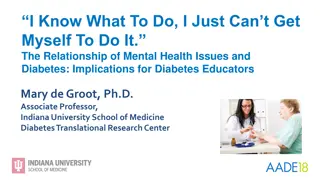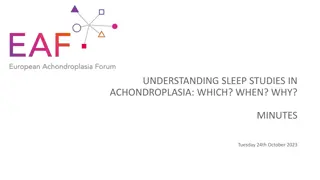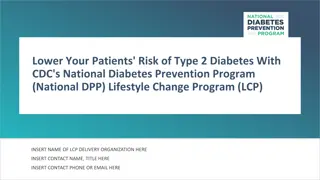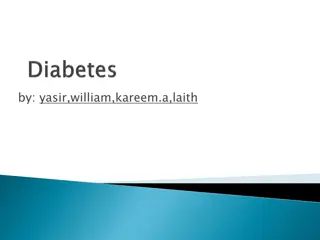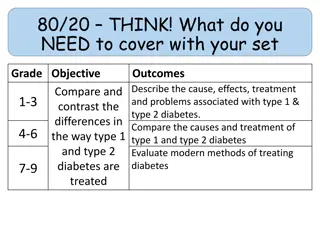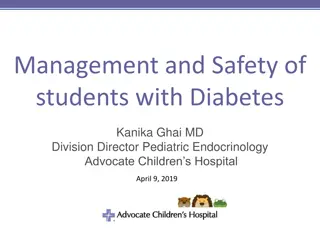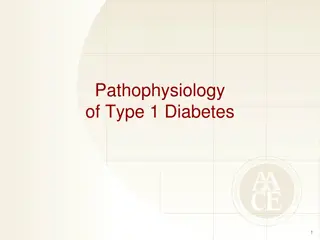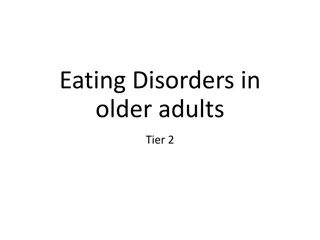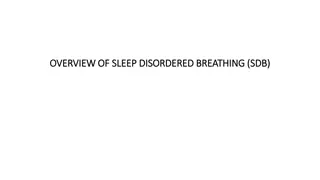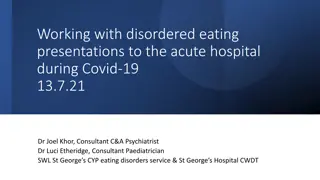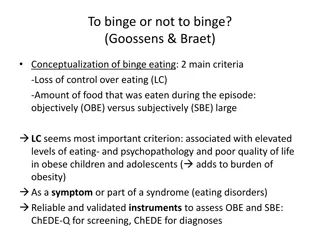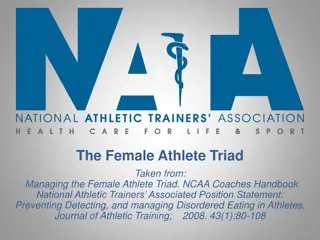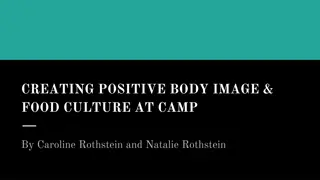
BEET Diabetes Study: Understanding Disordered Eating in Type II Diabetes
More than 37 million Americans are living with Type II Diabetes Mellitus, with some engaging in disordered eating behaviors. The BEET Diabetes Study aims to tackle these behaviors using Cognitive Behavioral Therapy, focusing on treating DEB as a necessary component for successful diabetes management. The study involves patient feedback, provider perspectives, intervention refinement, experimentation, and exploring the relationship between DEB and diabetes, including gender differences. Methods include a sample of approximately 50 patients and 20 providers, with interviews conducted over one to six months.
Download Presentation

Please find below an Image/Link to download the presentation.
The content on the website is provided AS IS for your information and personal use only. It may not be sold, licensed, or shared on other websites without obtaining consent from the author. If you encounter any issues during the download, it is possible that the publisher has removed the file from their server.
You are allowed to download the files provided on this website for personal or commercial use, subject to the condition that they are used lawfully. All files are the property of their respective owners.
The content on the website is provided AS IS for your information and personal use only. It may not be sold, licensed, or shared on other websites without obtaining consent from the author.
E N D
Presentation Transcript
TABLE OF CONTENTS 01 03 04 Overview & Background My Research 02 BEET Diabetes Study Reflections
Working with Dr. Phoutdavone Noy Phimphasone-Brady PhD Clinical health psychologist Specific training in women s physical and mental health Focuses on PCOS, type II diabetes and weight management Implementation science researcher OVERVIEW
More than 37 million Americans (1 in 10) are living with Type II Diabetes Mellitus Besides provider-sanctioned ways of managing diabetes (exercise, diet, medicine), people with T2DM can engage in disordered eating behaviors (DEB) DEB: induced vomiting, dietary restraint, compensatory behaviors Background
02 BEET (Balanced and Empowered EaTing) Diabetes Study Mixed Methods Intervention study looking at disordered eating behaviors in those with Type II Diabetes Mellitus How to tackle them using Cognitive Behavioral Therapy Hypothesis: Treating DEB should be a necessary and necessary component for successful diabetes management
AIMS IN BEET STUDY PATIENT FEEDBACK PROVIDER PERSPECTIVE Looking at the knowledge and skill sets of providers to see what barriers to treating DEB in those with T2DM exist Having patients provide feedback on intervention and their satisfaction 04 05 03 02 REFINEMENT 01 Refining the intervention according to feedback and data analysis, improving CBT EXPERIMENTATION Conducting a pilot trial to look at how effective CBT is in treating DEB in diabetes RELATIONSHIP Looking at the relationship between DEB and diabetes, as well as variations caused by gender
METHODS IN BEET STUDY SAMPLE ~ 50 patients ~ 20 providers 18-65 years, inclusive Type 2 diabetes diagnosis Screening for DE score >/= 2 DURATION METHODOLOGY 1 Month 6 Months All interviews recorded Mixed methods analysis, meaning quantitative and qualitative data is integrated ** Not a therapy session Treating symptoms of ED, but trying to treat subclinical population
14 pre-intervention surveys (including ACEs, DEPS-r, EDDS) 6 sessions over 9 weeks Cognitive Behavioral Therapy (CBT) Techniques Intervention 2. Establish regular pattern of eating and activity 6. 3. Alternatives to Disordered Eating 5. Dieting and Related forms of Avoidance 1. Getting Started 4. Problem Solving Maintenance & Relapse Prevention Supported by the NIH-funded Building Interdisciplinary Research Career s in Women s Health (BIRCWH) K12 Program
03 My Research Research Question: To what extent should childhood trauma and disordered eating behaviors be looked at together in people with Type II Diabetes?
The relationship between childhood trauma and disordered eating behaviors is not often looked at with people who are living with T2DM. Why?
Methodology Case Study Operational Definitions I am looking at two BEET study participants, Participant E and Participant S, and their ACE scores, DEPS-r scores, EDDS responses. ACEs ACEs Adverse Childhood Experience Questionnaire. 10 questions, score of 2+ is considered high ACE DEPS DEPS- -r r Diabetes Eating Problems Survey. 16 questions, score of 20+ indicates a level of disordered eating warranting further attention. EDDS EDDS Eating Disorder Diagnostic Scale. 22 questions.
Case Descriptions Participant E 58 year old Black female, 47.9 BMI, HbA1c level 7.0 First diagnosed in 2008 Has attended educational diabetes classes, has received behavioral health counseling but has not seen a diabetes-specific counselor Living with asthma, hyperlipidemia, hypertension, and obstructive sleep apnea DEPS-r Score: 33 Participant S 46 year old white female, 42 BMI, HbA1c level 7.3 First diagnosed in 2018 Has not received any education about diabetes, has not received any behavioral health counseling Living with hypertension and polycystic ovarian syndrome (PCOS) DEPS-r Score: 34 Ace score of 6 Answered YES to question 10 of EDDS
Results Both Participant E and Participant S have ACE scores of 6 6, classifying them as high ACE high ACE. . When a report was pulled of those with the highest DEPS-r scores, it was revealed that Participant S had a score of 34 second highest in the study second highest in the study, and Participant E had a score of 33 the third highest third highest. 34, the 33, In the EDDS surveys, both participants answered YES 10, asking if they eat large amounts of food even when they are eat large amounts of food even when they are not hungry not hungry. Participant E answered question 16 by saying she had fasted (skipped meals) about 10 times per month fasted (skipped meals) about 10 times per month. YESto question
Participant E ACEs Predicting DEPS-r Scores 40 35 Participant S DEPS-r Score 30 25 20 15 1 2 3 4 5 6 7 8 9 10 11 Graphed Results ACE Score
I've been struggling a little bit with depression. You know, of course, I have a little depression around the diabetes, but again, other things in life, not just diabetes I don't have the energy or the motivation to get up and walk, even though I want to Pre-Intervention Interview testimony
It's not necessarily the diabetes, but it affects my diabetes. Other things. The life things. Because it causes me to emotionally eat. Emotionally eating" Pre-Intervention Interview testimony
04 Reflections Conclusions Limitations What I learned
We can infer that a connection exists between adverse childhood experiences and a later experience of eating disorder psychopathology in those with diabetes There seem to be other confounding factors such as depression depression, that could be interesting to explore in tangent with DEB. Further studies should be conducted examining this connection on a broader level (more participants, more variables). confounding factors, Conclusion & Observation
Limitations Case Study did not include any male participants Case Study did not include Spanish- speaking participants
Gained a lot of awareness concerning research and its avenues Worked with a wonderful team Familiarity with RedCap, reaching out to participants, observing intervention sessions Mentorship Opportunities for learning Reflecting on my Experience
Acknowledgements Phoutdavone Noy Phimphasone-Brady, PhD - PI Paul Dormond-Brooks, Research Coordinator Perla Rodriguez, Research Assistant Devin Rodriguez, Research Assistant Zachary Giano, PhD, Biostatistician Dr. Ron-Li Liaw, Chair of PMHI Dr. Neill Epperson, Chair of Department of Psychiatry Dr. Dominic Martinez, Dir. Office of Inclusion and Outreach, CCTSI EmmalyPerks, Director PURPLE Program Yunliang (Lily) Luo, Assistant Director PURPLE Program Shanna Trott, PURPLE Program Coordinator Dr. Lindsey Rogers Dr. Neill Epperson s lab group
THANKS! CREDITS: This presentation template was created by Slidesgo, including icons by Flaticon, and infographics & images by Freepik Slidesgo Flaticon Freepik Please keep this slide for attribution

